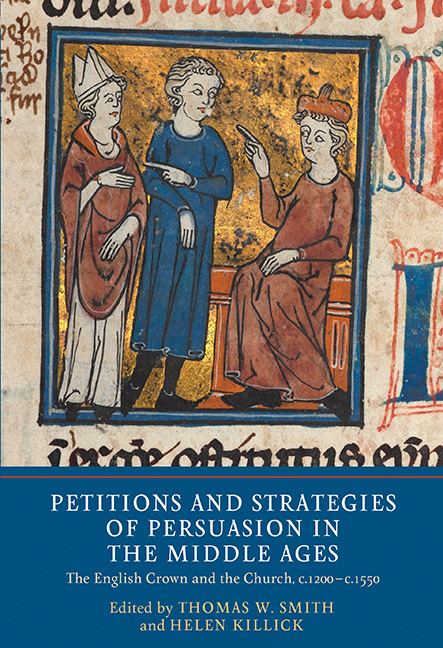 Petitions and Strategies of Persuasion in the Middle Ages
Petitions and Strategies of Persuasion in the Middle Ages Book contents
- Frontmatter
- Dedication
- Contents
- Contributors
- Foreword
- Acknowledgements
- List of Abbreviations
- Introduction: Medieval Petitions and Strategies of Persuasion
- 1 Blood, Brains and Bay-Windows: The Use of English in Fifteenth- Century Parliamentary Petitions
- 2 Petitioners for Royal Pardon in Fourteenth-Century England
- 3 The Scribes of Petitions in Late Medieval England
- 4 Patterns of Supplication and Litigation Strategies: Petitioning the Crown in the Fourteenth Century
- 5 Petitions of Conflict: The Bishop of Durham and Forfeitures of War, 1317–1333
- 6 A Tale of Two Abbots: Petitions for the Recovery of Churches in England by the Abbots of Jedburgh and Arbroath in 1328
- 7 ‘By Force and Arms’: Lay Invasion, the Writ de vi laica amovenda and Tensions of State and Church in the Thirteenth and Fourteenth Centuries
- 8 The Papacy, Petitioners and Benefices in Thirteenth-Century England
- 9 Playing the System: Marriage Litigation in the Fourteenth Century
- 10 Killer Clergy: How did Clerics Justify Homicide in Petitions to the Apostolic Penitentiary in the Late Middle Ages?
- Index
2 - Petitioners for Royal Pardon in Fourteenth-Century England
Published online by Cambridge University Press: 20 August 2020
- Frontmatter
- Dedication
- Contents
- Contributors
- Foreword
- Acknowledgements
- List of Abbreviations
- Introduction: Medieval Petitions and Strategies of Persuasion
- 1 Blood, Brains and Bay-Windows: The Use of English in Fifteenth- Century Parliamentary Petitions
- 2 Petitioners for Royal Pardon in Fourteenth-Century England
- 3 The Scribes of Petitions in Late Medieval England
- 4 Patterns of Supplication and Litigation Strategies: Petitioning the Crown in the Fourteenth Century
- 5 Petitions of Conflict: The Bishop of Durham and Forfeitures of War, 1317–1333
- 6 A Tale of Two Abbots: Petitions for the Recovery of Churches in England by the Abbots of Jedburgh and Arbroath in 1328
- 7 ‘By Force and Arms’: Lay Invasion, the Writ de vi laica amovenda and Tensions of State and Church in the Thirteenth and Fourteenth Centuries
- 8 The Papacy, Petitioners and Benefices in Thirteenth-Century England
- 9 Playing the System: Marriage Litigation in the Fourteenth Century
- 10 Killer Clergy: How did Clerics Justify Homicide in Petitions to the Apostolic Penitentiary in the Late Middle Ages?
- Index
Summary
Over the course of the fourteenth century approximately 38,000 letters patent of pardon were issued from the royal chancery, and numbers were increasing across the period, despite the dramatic fall in population after the Black Death in mid-century. This compares with approximately 800 petitions for (or relating to) pardon that survive in the collections of The National Archives. Thus barely 2 per cent of the pardons known to have been issued can be matched with a surviving written petition for pardon. Of course, it is unlikely that all written petitions have survived, and in some instances it is clear that there never was a written petition; supplicants or their representatives appealed for mercy in person. More usually, individuals who hoped for pardon received one on the recommendation of a trial judge after appearing in court. Indeed, it is important to note that these petitions do not represent the norm. It was more usual for a trial judge to recommend pardon in consideration of clear mitigating factors, and by the fourteenth century recognised procedures had been established for judges to recommend pardon and for the chancellor to grant one as a matter of course (de cursu) rather than involve the king directly by petitioning for his mercy (de gracia). But, for some people, taking the initiative themselves and petitioning for pardon seemed the most prudent course of action. They might do so if they feared arrest or if they were indignant at a ‘malicious accusation’ against them and sought to clear their name. If they were in prison awaiting trial or had already been outlawed they might seek a patron to act on their behalf rather than wait and trust in the lengthy and costly legal process. Sometimes they argued that they deserved pardon; on other occasions they admitted guilt, but appealed to the king to show mercy. For those who did decide to have a petition drawn up there were conventions to follow; by the fourteenth century a discrete culture of petitioning for pardon can be discerned.
As far as they can be dated at all, the petitions for pardon are skewed to the first half of the fourteenth century. Approximately three-quarters of them date to before 1350. This mirrors the overall trend for petitions, with the heaviest concentration in the same period. All were written in Anglo-Norman French, as was the convention.
- Type
- Chapter
- Information
- Petitions and Strategies of Persuasion in the Middle AgesThe English Crown and the Church, c.1200–c.1550, pp. 40 - 63Publisher: Boydell & BrewerPrint publication year: 2018


